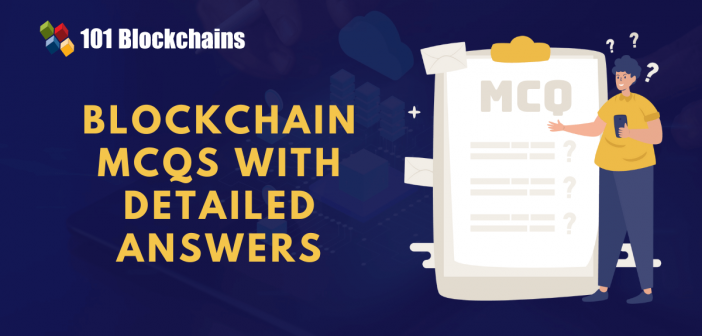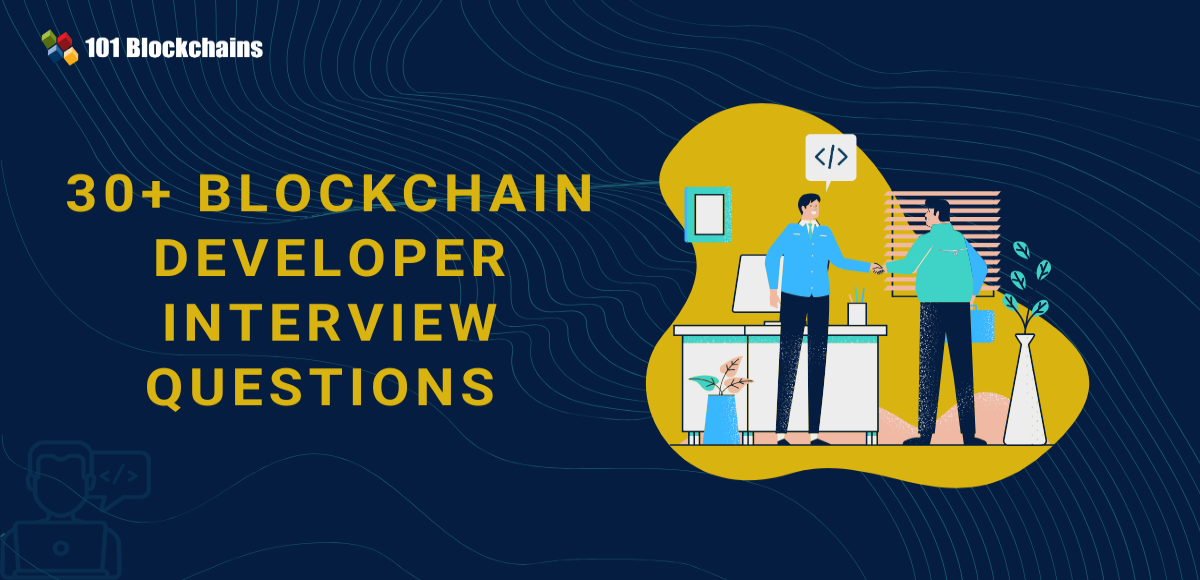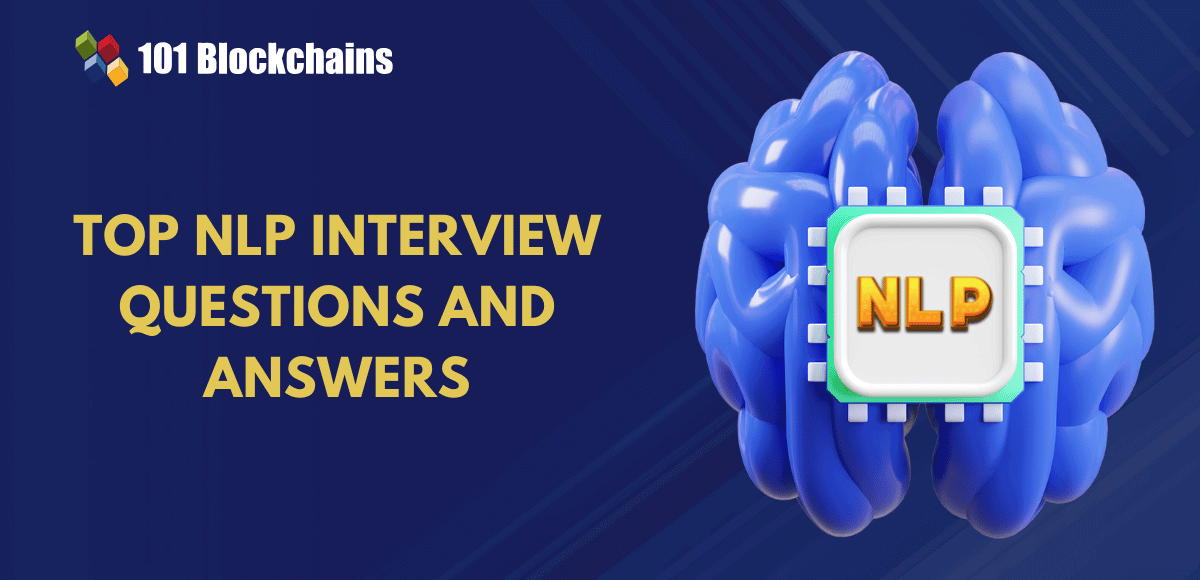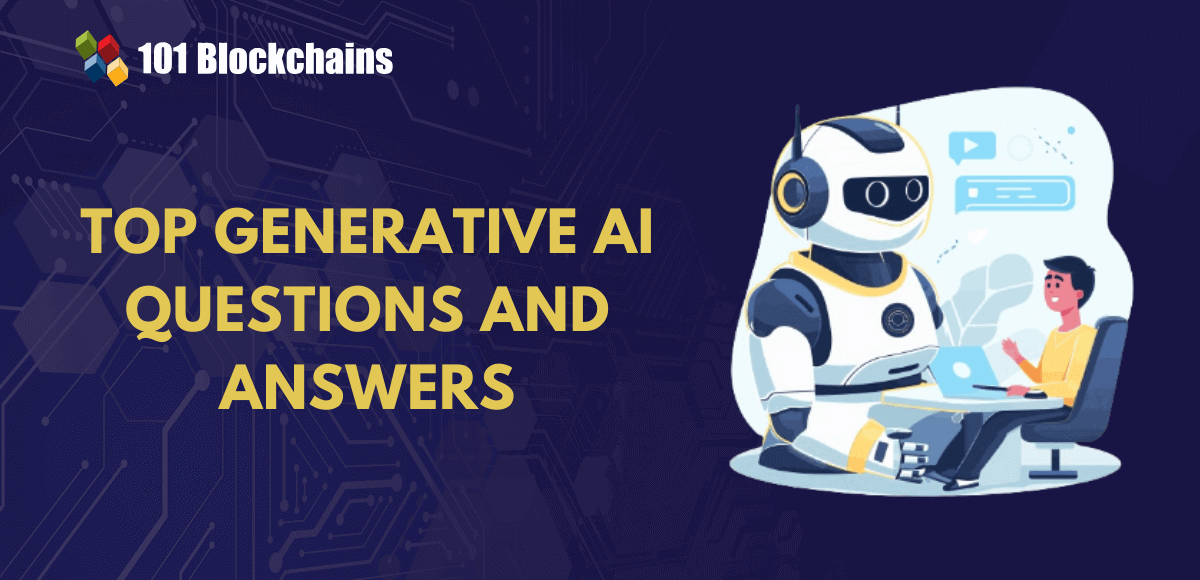Learn how blockchain truly works, master key definitions, and uncover what makes smart contracts so "smart." Dive into the fundamentals, gain valuable insights, and start your blockchain journey today!

Interview Preparation
Georgia Weston
on May 10, 2023
Blockchain Multiple-Choice Questions (MCQs)
Blockchain is one of the prominent examples of how innovation can transform the way we use technology. It provides an immutable and decentralized database, which can facilitate data storage in nodes linked to each other in a network of computers. The growing interest in blockchain technology has spurred the demand for new learning resources. Can you rely on blockchain MCQs to learn about blockchain technology? Peer-to-peer technology has achieved success in decentralized data management and better security.
Decentralized finance applications, non-fungible tokens, and cryptocurrencies are the most noticeable factors which come to mind when you think of blockchain. In addition, blockchain technology can support use cases in manufacturing, supply chain management, and cybersecurity alongside different business functions. You can learn more about blockchain in an interactive manner with the following questions related to blockchain technology.
Build your identity as a certified blockchain expert with 101 Blockchains’ Blockchain Certifications designed to provide enhanced career prospects.
Most Popular Blockchain Multiple-Choice Questions
Multiple-choice questions, or MCQs, are an engaging instrument for learning about any new technology or topic. You can use a blockchain quiz to test your knowledge of blockchain technology. At the same time, explanations for the answers to multiple-choice questions related to blockchain can offer a productive approach to learning blockchain technology.
In addition, multiple-choice questions on blockchain can help you prepare for blockchain job interviews. Multiple-choice questions can offer an effective tool for beginners to uncover the important concepts of blockchain technology with supporting explanations. Here are some of the most popular blockchain multiple-choice questions you should prepare for in 2023.
1. What is the term applied for splits in a blockchain network?
- Mergers
- Divisions
- Forks
- None of the above
The correct answer to the question is the third option, i.e., forks. You can explain answers to such questions on blockchain by referring to the definition of forks. Blockchain forks are the events when a blockchain network has to go through a protocol modification. Forks can also happen when two or more blocks feature the same block height.
According to the basic design of blockchain, all the participants on the network must agree to the state of the blockchain across all nodes in the network. However, the nodes cannot arrive at a consensus regarding specific proposals or transactions, thereby leading to a split in the blockchain network.
2. Which trees are responsible for storing all transactions in a black through digital signatures of the complete set of transactions?
- Binary
- Merkle
- Red Black
- AVL
The correct answer to the question is the second option, i.e., Merkle trees. One of the important highlights of blockchain technology is the ability to record proof of ownership of digital assets. The responses to such blockchain technology questions must focus on the working of Merkle trees and their unique functionality. The Merkle tree can help users in verifying the possibility of including a transaction in a block. On top of it, the Merkle trees are created through repeated hashing of node pairs till only one hash remains.
3. Which of the following choices is a type of blockchain?
- Restricted blockchain network
- Private blockchain network
- Constraint blockchain network
- Open blockchain network
The correct response to the question is the second option, i.e., private blockchain network. You can answer such blockchain quiz questions with a clear impression of the different types of blockchain networks. The four common variants of blockchain networks include public, private, hybrid, and consortium blockchain networks. Private blockchain networks, as the name implies, could operate on a closed network and features restrictions on access and control privileges. On the other hand, public blockchain networks work in a permissionless and non-restrictive manner.
Curious to learn about blockchain implementation and strategies? Enroll Now in Blockchain Technology – Implementation And Strategy Course!
4. What are the important traits of blockchain technology?
- Decentralization
- Immutability
- Transparency
- All of the above
The correct answer to the question is the fourth option, i.e., all of the above. Blockchain technology has emerged as a secure and efficient improvement over conventional approaches to digital transactions. Some of the biggest questions about blockchain are directly related to the unique traits of blockchain technology.
Decentralization is the most fundamental trait of blockchain technology, which helps in removing intermediaries and introducing self-governance. The immutability traits of blockchain technology suggest that anything published on the blockchain cannot be modified. Transparency in blockchain indicates that transactions on blockchain networks are public and visible to every network participant.
5. What can you find in the block of a blockchain?
- Timestamp
- Transaction data
- Hash point
- All of the above
The correct answer to the question is the fourth option, i.e., all of the above. Blocks serve as the foundational element of blockchain networks. The blocks include details of transactions on the blockchain network and are linked with each other through cryptographic mechanisms. Blocks include the cryptographic hash point to the previous block alongside a timestamp, which shows the time of transaction approval. The answers to such multiple-choice questions on the blockchain would also reflect on how blocks store transaction data.
Start learning Blockchain with World’s first Blockchain Skill Paths with quality resources tailored by industry experts Now!
6. What are the advantages of blockchain technology?
- Security and speed
- User control over data
- Cost-effective transactions
- All of the above
The correct response to the question is the fourth option, i.e., all of the above. You can find such blockchain MCQs in interviews to prove your knowledge about the potential of blockchain technology. Blockchain technology leverages cryptographic mechanisms to ensure security, and decentralization ensures freedom from intermediaries, thereby ensuring faster transactions. At the same time, the removal of intermediaries also helps in ensuring cost savings for blockchain transactions. Most important of all, users can have complete control over their data and assets on a blockchain network without risks of censorship.
7. What is the name of the first block in a blockchain?
- Genesis block
- Origin block
- Block one
- None of the above
The correct answer to the question is the first option, i.e., genesis block. The response to blockchain questions on the genesis block should highlight how it is the only block that does not depend on a previous block. Genesis block in a blockchain helps in defining crucial parameters, such as consensus mechanism and level of difficulty for mining blocks on the network.
Start your blockchain journey Now with the Enterprise Blockchains Fundamentals – Free Course!
8. Can blockchain technology offer access to financial transactions like banks without any intermediaries?
- True
- False
The correct answer to the question is the first option, i.e., true. You can find the biggest questions about blockchain technology referring to the feature of decentralization in blockchain. Decentralization can ensure that blockchain offers access to financial services without depending on intermediaries. The examples of DeFi solutions can provide supporting evidence for the utilization of blockchain technology in enabling access to financial services.
9. Where can you use smart contracts?
- Supply chain management
- Copyright protection
- Legal agreements
- Insurance Underwriting
The correct response to the question would be all the options. Such blockchain quiz questions can test your knowledge about smart contracts and their applications. Smart contracts serve as digital variations of real-world contracts deployed on blockchain networks for facilitating automated transactions. Smart contracts help in automating transactions by predefining the specific actions in code. The code executes desired transactions according to provided inputs when the transaction fulfills the conditions specified in the smart contract.
Curious to understand the complete smart contract development lifecycle? Join the Standard & Premium Plans and get free access to the Smart Contracts Development Course Now!
10. What is a dApp?
- A blockchain network
- Type of cryptocurrency
- Decentralized application
- Hardware component
The correct answer to the question is the third option, i.e., decentralized application. References to blockchain technology questions on dApps should explain how developers can use smart contracts for designing conventional apps with the blockchain advantage. Decentralized apps, or dApps, have served as an integral highlight in the radical expansion of the blockchain ecosystem.
11. What is the incentive for miners to validate transactions?
- Appreciation of the community
- Nonce
- Additional memory
- Block rewards
The correct answer to the question is the fourth option, i.e., block rewards. Miners in the Proof of Work consensus algorithm receive block rewards in return for the successful validation of a block. Successful miners can have the privilege of adding a block to the chain and would receive newly minted tokens as the block reward.
Not sure how to build your career in enterprise blockchains? Enroll Now in How to Build Your Career in Enterprise Blockchains Course
12. What is Proof of Stake?
- Method for creation of private keys
- Certificate required for blockchain usage
- Consensus mechanism
- Password for accessing the blockchain platform
The correct answer to the question is the third option, i.e., consensus mechanism. Proof of Stake is one of the common highlights in basic questions on blockchain and its working. It is a consensus mechanism that helps a blockchain network in achieving distributed consensus. In the case of Proof of Stake blockchain networks, users can receive the privilege of validating transactions according to their stake in the network.
13. What was the intended objective for creating blockchain?
- Research project
- Peer-to-peer electronic cash system
- Open-source network for connecting banks
- None of the above
The correct answer to the question is the second option, i.e., peer-to-peer electronic cash system. You can respond to such questions in a blockchain quiz by reviewing the definition of the Bitcoin blockchain and its origins. Bitcoin is the first practical example of the applications of blockchain technology. It was designed as a peer-to-peer electronic cash system for enabling transactions between two users in a trustless environment without intermediaries.
Want to become a bitcoin expert? Enroll Now in Getting Started with Bitcoin Technology Course
14. What is the security incident when attackers gain control over the blockchain network resources?
- Reentrancy attack
- 51% attack
- Brute force attack
- Invasion attack
The correct answer to the question is the second option, i.e., 51% attack. Security is one of the biggest questions about blockchain applications and is crucial for the adoption of blockchain. 51% attack refers to the situation when attackers take control over the majority of the blockchain network resources. In the case of Proof of Work blockchains, 51% of attacks involve attackers gaining control over the majority of computational resources on the network. With Proof of Stake blockchains, 51% of attacks involve taking control over the majority portion of the stakes in the network.
15. What is the first step of a blockchain project?
- Planning and specification of requirements
- Feasibility study
- Definition of project goals
- Design of user interface
The correct answer to the question is the first option, i.e., planning and specification of requirements. You can answer such multiple choice questions on blockchain by pointing out the necessity of planning and specification of requirements. How can you start a blockchain project without creating a plan and identifying the essential requirements? The clear specification of requirements for the blockchain project can help design accurate and value-based protocols, systems, and networks.
Aspiring to make a lucrative career as a blockchain expert but not sure how? Check the detailed guide Now on How To Become A Blockchain Expert
Conclusion
The outline of common blockchain MCQs offers insights into different fundamental concepts of blockchain technology. Did you notice something different about learning blockchain through multiple-choice questions? The element of doubt and curiosity regarding the right answer to MCQs makes them an interesting choice for learning.
Why would you avoid an interesting way to learn blockchain while having fun? On top of it, you could also find simple explanations for the answers to MCQs, which provide easier ways to understand blockchain technology. At the same time, multiple-choice questions are a great option for testing your blockchain knowledge. Learn more about blockchain technology and how it works in detail to excel in all the MCQs about blockchain technology right now.
*Disclaimer: The article should not be taken as, and is not intended to provide any investment advice. Claims made in this article do not constitute investment advice and should not be taken as such. 101 Blockchains shall not be responsible for any loss sustained by any person who relies on this article. Do your own research!






